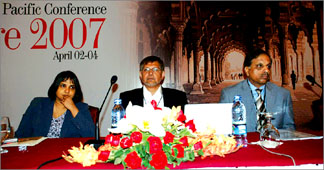Call to recognise potential benefits of mobile communication
New Chair of GSM Asia Pacific and GSM South Asia from
Dialog Telekom Lanka :
|

GM Legal International Business and Administration Dialog TeleKom
Ltd Sri Lanka and new Chairperson GSMAP Anoja J. Obeyesekere,
Outgoing Chairman -Mehboob Chowdhury and Chairman PTA Major General
Shahzada Alam Malik.
|
The 26th GSM Asia Pacific (GSMAP) conference and exhibition ended in
Lahore on Monday urging the active involvement of Governments,
Regulators and Telecom Operators in the Asia Pacific region to pursue
policy routes that fully recognise the potential benefits of mobile
communication.
GSMAP, the Asia Pacific Interest Group of the GSM Association covers
over 30 countries and over 100 GSM operators. The Asia Pacific Interest
Group spans the Pacific rim, Australia/New Zealand, China and South East
Asian countries including Singapore, Malaysia and Hong Kong. The region
accounts for 37% of the world's GSM subscribers and enjoys the fastest
growth rate in the GSM world.
The key trends impacting the mobile sector such as mobile at the
centre of fixed, internet and service convergence, mobile broadband
evolution and regulations for Next Generation Networks (NGN) were
discussed in detail at the conference.
Around 130 delegates from 54 companies participated. The conference
agenda also featured presentations by international experts on mobile
technology, and regional industry leaders speaking on leading edge
topics such as 3rd Generation GSM products and services, Revolutionary
advances in mobile value added services and International Roaming and
Low ARPU in high growth markets,
"The operators were unanimous in their view that the prevalent
regulations must enshrine principles of fair competition, regulatory
independence and reflect long term policy goals linked to national,
social and economic development goals of the country" Mehboob Chowdhury,
the outgoing chairman of GSM Asia Pacific (GSMAP) region, told the press
briefing.
He said that the discussions at the conference also focused on the
challenges arising from the migration to Next Generation Networks (NGN)
based on Internet protocol (IP) as most of the current regulatory
principles are based on a circuit-switched environment.
NGN networks are often regarded as a combination of the
telecommunication and internet environments and the required regulatory
model for NGN networks would be different to the existing model.
General Malik, Chairman, Pakistan Telecommunication Authority (PTA)
said that today we can see the significant growth in the telecom
industry in Pakistan, which has attracted US$ 9 Billion foreign
investment in the last three years, and another USD 4 Bn is expected
during the next three to four years.
The cellular mobile subscribers have crossed the unprecedented number
of 50 Mn with 1.5 Mn new subscribers joining each month. We can see
Pakistan taking the lead by being the first country in South Asia to
have implemented the Mobile Number Portability facility. After MNP, the
growth of the industry will become more promising, as this would
intensify competition among cellular operators and act as a catalyst in
making this sector more competitive.
Mrs. Anoja J. Obeyesekere, the outgoing Deputy Chair of the region
and also the General Manager Legal, International Business and
Administration of Dialog Telekom Limited Sri Lanka was elected as the
new chairperson of GSMAP for the tenure of 2007-09 and Kukuh Saworo,
Vice President Network Planning and Development of PT.
Excelcomindo Pratama of Indonesia was elected as the new Deputy
Chairman of the region.
The newly elected Chair Mrs. Anoja Obeyesekere said that Asia Pacific
being the fastest growing market in the world, the majority of the next
billion mobile users will come from the Asia pacific region.
The policy makers and the operators of this region will have a
significant role to play to take advantage of the positive economic and
social effects brought in through wider access to mobile communication.
|
